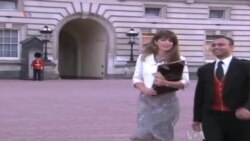LONDON —
The story of a worker at London’s royal residence Buckingham Palace, who played a key role in announcing the birth of Prince William and Kate’s baby last week, has ignited a debate over immigration and visas in Britain.
The large crowds that had gathered outside Buckingham Palace last week celebrated when the official notice of the birth of Kate and William’s baby boy was posted on an ornate golden easel in the palace grounds.
But few of the witnesses, or the millions watching on television around the world, knew the extraordinary story of the young Indian man who carried the notice across the courtyard and secured it in place.
Badar Azim, 25, had risen from the back streets of Kolkata in India, where he was educated at an orphanage, via university in Scotland thanks to $15,000 raised by the school, to eventually work for Britain’s royal household.
But just days after his moment of fame, Badar Azim was back in India after his employment ended and he was told his visa would not be renewed.
The tale has put the spotlight on the British visa system.
Pledging to crack down in immigration, the government introduced restrictions last year which mean students can only stay in Britain if they find a job that’s sponsored or they earn enough money.
Among the lucky ones was Indian student Arjun Sathe, who found employment after graduating from business school.
"Everyone pretty much underestimated the reluctance to sponsor a graduate. And essentially people didn't expect that it would be that difficult," said Sathe.
On a visit to Delhi last year, Mayor of London Boris Johnson criticized the restrictions.
“We need to make sure the visa system is not a deterrent to international students, and in so far as adding these extra stipulations like the need to have a salary up to a certain amount before you're allowed to stay on, I think we need to be very careful that we're not doing stuff that actively deters foreign students," he said.
The British government said the restrictions were needed to prevent abuse of the student visa system. But many British businesses criticized the changes. Universities estimate that fees from foreign students are worth $3.8 billion.
Nicola Dandridge, chief executive of Universities UK, a group representing higher education institutions, says Britain as a whole loses out.
"These are highly skilled people, many of whom we'd like to stay in this country and do highly skilled jobs," Dandridge said. "So there is this question of us losing talent in the UK, which we can ill afford to do.”
Meanwhile Britain is planning a pilot scheme to force visitors from six countries - India, Pakistan, Bangladesh, Sri Lanka, Nigeria and Ghana - to pay a $4,500 visa bond.
In a statement, the government said, "In the long run we're interested in a system of bonds that deters overstaying and recovers costs if a foreign national has used our public services."
India has called the measure a retrograde step.
The large crowds that had gathered outside Buckingham Palace last week celebrated when the official notice of the birth of Kate and William’s baby boy was posted on an ornate golden easel in the palace grounds.
But few of the witnesses, or the millions watching on television around the world, knew the extraordinary story of the young Indian man who carried the notice across the courtyard and secured it in place.
Badar Azim, 25, had risen from the back streets of Kolkata in India, where he was educated at an orphanage, via university in Scotland thanks to $15,000 raised by the school, to eventually work for Britain’s royal household.
But just days after his moment of fame, Badar Azim was back in India after his employment ended and he was told his visa would not be renewed.
The tale has put the spotlight on the British visa system.
Pledging to crack down in immigration, the government introduced restrictions last year which mean students can only stay in Britain if they find a job that’s sponsored or they earn enough money.
Among the lucky ones was Indian student Arjun Sathe, who found employment after graduating from business school.
"Everyone pretty much underestimated the reluctance to sponsor a graduate. And essentially people didn't expect that it would be that difficult," said Sathe.
On a visit to Delhi last year, Mayor of London Boris Johnson criticized the restrictions.
“We need to make sure the visa system is not a deterrent to international students, and in so far as adding these extra stipulations like the need to have a salary up to a certain amount before you're allowed to stay on, I think we need to be very careful that we're not doing stuff that actively deters foreign students," he said.
The British government said the restrictions were needed to prevent abuse of the student visa system. But many British businesses criticized the changes. Universities estimate that fees from foreign students are worth $3.8 billion.
Nicola Dandridge, chief executive of Universities UK, a group representing higher education institutions, says Britain as a whole loses out.
"These are highly skilled people, many of whom we'd like to stay in this country and do highly skilled jobs," Dandridge said. "So there is this question of us losing talent in the UK, which we can ill afford to do.”
Meanwhile Britain is planning a pilot scheme to force visitors from six countries - India, Pakistan, Bangladesh, Sri Lanka, Nigeria and Ghana - to pay a $4,500 visa bond.
In a statement, the government said, "In the long run we're interested in a system of bonds that deters overstaying and recovers costs if a foreign national has used our public services."
India has called the measure a retrograde step.





